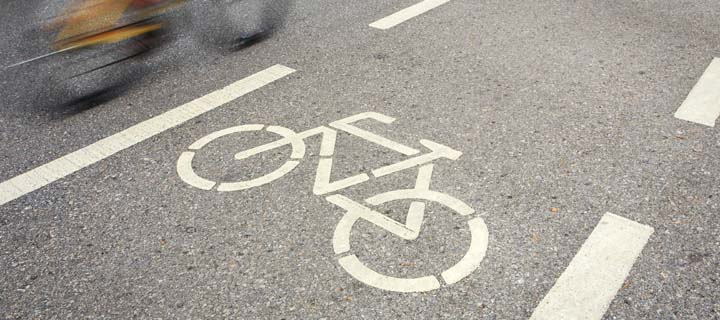
Over the past century, many of our states, cities, counties, and towns have built many miles of streets and roads that are safe and comfortable only for travel in one way: in a motor vehicle. These roadways often lack sidewalks, have lanes too narrow to share safely with bicyclists, and feature few, poorly marked, or dangerous pedestrian crossings.
More than 5,000 pedestrians and bicyclists die each year on U.S. roads. At the same time, the demand for walkable, bikeable communities is higher than ever before. Communities are recognizing the need to support walking, bicycling, and safe routes to transit for people of all ages and abilities by increasing funding, advancing Complete Streets policies, supporting equitable Vision Zero policies, revising comprehensive plans to incorporate active transportation, and addressing the many additional ways that our current policies and practices fail to support equitable transportation.
Active Transportation: A Matter of Equity
Low-income people and people of color currently walk and bicycle at rates that are similar to or higher than the rest of the population, and those rates are growing more rapidly. The obstacles encountered in our car-centric society for those who do not have consistent access to a car affect these populations more profoundly, limiting access to daily needs and to upward mobility. And the health and community benefits of active transportation have the potential to significantly address some of the disparities that are deeply detrimental for many low-income communities and communities of color.
Low-income people have the highest rates of walking and bicycling to work. Children from low-income households and children of color, particularly Latinos and African Americans, are more likely to bike or walk to school than whites or higher-income students. Yet low-income communities have fewer sidewalks, bike lanes, and street lights than high-income communities, meaning conditions for walking and bicycling are more dangerous. As a result, low-income people are twice as likely to be killed while walking than high-income people.
Increasingly, communities of color and low income communities are organizing to support walking and biking in their neighborhoods and demand investment in safe streets. This work is a key area of effort for the Safe Routes Partnership and the Safe Routes to School community.
Complete Streets Policies
Each year local jurisdictions throughout the United States spend a combined total of hundreds of billions of dollars to build new roads and highways and to reconstruct and resurface existing facilities. This investment provides an opportunity to design and implement "Complete Streets" which serve the needs of all transportation users including pedestrians, bicyclists, people with disabilities, transit riders, and automobile users. A seamless network of Complete Streets including on-street walking and bicycling facilities, trails, and transit should connect schools, homes, shopping, employment centers, recreation areas, and other destinations.
Complete Streets policies require that every time a street is newly built or renovated, it is made complete by providing safe facilities for all transportation users – pedestrians, bicyclists, the disabled, transit users, and motorists. This is an important strategy for Safe Routes to School, as children are our most vulnerable roadway users, and roads leading to schools are regularly built and reconstructed.
Complete Streets policies can be inserted into general plan documents, regional transportation plans, or funding mechanisms such as bonds or transportation sales taxes. They can be legislated through state or local laws, or through resolutions by governing bodies. Alternatively, policies can be internally adopted by public works departments or state departments of transportation.
Active Transportation Equity Work Group
The National Active Transportation Equity Work Group is composed of a broad array of experts and practitioners from around the country who engage in a national conversation and support outreach that elevates equity in active transportation to a state and national issue.
Bringing together both active transportation and social justice experts, the work group serves as a rare space to critically discuss and take action at the intersection of active transportation and equity. The group aims to centrally locate equity in active transportation and prioritize active transportation in the social justice movement to expand the framing and understanding, policy goals, and allies of walking, biking, and rolling.
- Active Living Research
- Alan M. Voorhees Transportation Center Rutgers, The State University of New Jersey
- American Heart Association
- America Walks
- Bike Easy - New Orleans
- Department of Urban Planning and Environmental Policy, Texas Southern University
- Detroit Greenways Coalition
- Gamaliel and Transportation Equity Network
- Girltrek
- Institute of Transportation Engineers
- Kaboom
- Leadership Conference for Civil and Human Rights
- Los Angeles County Bike Coalition
- NAACP
- National Complete Streets Coalition
- National Disability Rights Network
- National League of Cities
- National Urban League
- Trust for Public Lands
- Walkable and Livable Communities Institute
- Untokening & UC Irvine
State & Local Active Transportation Financing Work Group
The National State & Local Active Transportation Financing Work Group is composed of a broad array of experts and advocates from around the country who engage in a national conversation to make securing funding for walking, biking, and rolling easier across the nation.
Because there is no single surefire formula to secure funding for walking and biking, connecting advocates and experts in the state and local financing arena is more vital than ever to share successful strategies and lessons learned. By convening experts and advocates, the group aims to increase collaboration and understanding of solutions to make it easier to secure funding so that everyone can walk, bike, and take public transportation to address everyday needs.
- America Walks
- Bicycle Coalition of Greater Philadelphia
- Bike Texas
- Community Transportation Association of America
- Investing in Place
- National Conference of State Legislatures
- The Leadership Conference on Civil and Human Rights
- Transportation Alternatives
- WalkDenver
